Classics and the Western Canon discussion
The Magic Mountain
>
Week 8.3 -- Mynheer Peeperkorn and Vingt et un
date newest »
newest »
 newest »
newest »
 I love the way Mann brought in such an interesting character at this point in the novel. I think Mynheer Peeperkorn is the most interesting character in MM. I love the way he just takes charge of every situation he's in, without actually saying anything!! Would "eccentric" be a description for him? Or just a bit crazy? (Although it's clear that he's quite intelligent, in spite of his fragmented way of speaking. I'm not quite sure what type of a character Mann is trying to show us in MP.)
I love the way Mann brought in such an interesting character at this point in the novel. I think Mynheer Peeperkorn is the most interesting character in MM. I love the way he just takes charge of every situation he's in, without actually saying anything!! Would "eccentric" be a description for him? Or just a bit crazy? (Although it's clear that he's quite intelligent, in spite of his fragmented way of speaking. I'm not quite sure what type of a character Mann is trying to show us in MP.)As Everyman asks in Message 1 of this thread: "...did everybody notice the change Mann shows in HC?" My answer is YES, ABSOLUTELY. And I LOVE this new change in HC.
I was also wondering if Peeperkorn was actually Peppercorn.
Barbara wrote: "I love the way Mann brought in such an interesting character at this point in the novel. I think Mynheer Peeperkorn is the most interesting character in MM. I love the way he just takes charge of e..."
Can anyone think of another novel where a pivotal character is not introduced until after 500 pages?
Can anyone think of another novel where a pivotal character is not introduced until after 500 pages?
I am pretty sure that we are now past the place where this would be a spoiler. And, if not, it is not a major spoiler. I've wanted to ask people's opinions about the fact that S. and N. end up living together.
Is this Mann juxtaposing thier positions in an ironic manner? Or is there something in the psychology of each character that makes them need each other?
And now Peeperkorn is thrown into the mix--or, more accurately overturns the whole mix. Oh my!
Is this Mann juxtaposing thier positions in an ironic manner? Or is there something in the psychology of each character that makes them need each other?
And now Peeperkorn is thrown into the mix--or, more accurately overturns the whole mix. Oh my!
 Zeke wrote: "I've wanted to ask people's opinions about the fact that S. and N. end up living together.
Zeke wrote: "I've wanted to ask people's opinions about the fact that S. and N. end up living together.Is this Mann juxtaposing thier positions in an ironic manner? Or is there something in the psychology of each character that makes them need each other?"
It makes sense that S. and N. live together as similar personalities but intellectual opposites, and it fits in with the theme of dichotomies that runs through the book. I'm coming to the conclusion that their flimsy philosophical arguments are to be taken thematically as well. They serve the same purpose as their living arrangements -- to exemplify the theme of dichotomy. Either that or Mann is making a joke of philosophy, and a great many other things besides.
I haven't read past this chapter yet, so I have to assume that Peeperkorn takes on more substance in the following chapters. To this point he doesn't do much but stammer and drink! Obviously HC sees him as a great "personality" (after a few bottles of wine) but it's hard to see why at this point. But I am duly impressed by the amount of alcohol these supposedly sick people can consume. I assume the next chapter will start with an extra long rest cure.
 Zeke wrote: "I've wanted to ask people's opinions about the fact that S. and N. end up living together."
Zeke wrote: "I've wanted to ask people's opinions about the fact that S. and N. end up living together."And also about the very considerable difference in the style each is living in.
 Thomas Mann had success to surprise me! I really wondered what would come next after Settembrini and Naphta. Ha! Mynheer Peeperkorn (yes, peppercorn) is not bad, he is the evil itself: Not one who thinks wrong in this or that way, but one who does not think at all. Not one who tries to convince, but one who leads by hypnotic dictate. One who is driven by emotion and drives others to emotions. Even Naphta is called "democratic" in comparison, I fully agree with Thomas Mann, here. And Hans Castorp behaves "democratically" before Mynheer Peeperkorn: He argues too much.
Thomas Mann had success to surprise me! I really wondered what would come next after Settembrini and Naphta. Ha! Mynheer Peeperkorn (yes, peppercorn) is not bad, he is the evil itself: Not one who thinks wrong in this or that way, but one who does not think at all. Not one who tries to convince, but one who leads by hypnotic dictate. One who is driven by emotion and drives others to emotions. Even Naphta is called "democratic" in comparison, I fully agree with Thomas Mann, here. And Hans Castorp behaves "democratically" before Mynheer Peeperkorn: He argues too much. Strange also, that Thomas Mann used the word "Führer" several times and the word "Wucht" to describe Peeperkorn's effect on others: It was Goebbels who defined good propaganda as "Einfachheit, Wucht und Konzentration" = Simplicity, Impact/vehemence, and Concentration. This in 1924 when there was no thought of Hitler and Goebbels! This is really an astonishing example of divination by literature. (Lowe-Porter just omits the word "Wucht" - tststs)
Peeperkorn's character is clearly revealed by the words of Mme Chauchat on Settembrini: She did not like Settembrini because he was not "human". A strange and yet so familiar use of "human"! Isn't it? Defining "cold rationality" as "not human"!!! Mme Chauchat defines "human" exclusively by emotionality as it seems. What a mistake!
This use of "human" can be found with all who like to be part of their social group without own thinking. All who reject to argue on the pros and cons of Iraq war, torture, greenhouse effect, social insurance, gay marriage, etc., who form their opinions just by emotions, according to the pattern: "How can you dare to apply cold rationality to" ... war / torture / religious tolerance / helping the poor / protecting minorities / saving the planet!!! Ah yes, remember Al Gore's movie on global greenhouse warming? What a great Peeperkorn movie! What a lack of argument -- what a great show of alleged threats!
All liberals may forgive me, but I imagine Mynheer Peeperkorn as Bill Clinton: A tall man with white hair, with charisma, led by emotions and leading by emotions. Just lucky to have been president in the prosperous 90s -- he made a great show and provided good feelings to all his supporters! IMHO the perfect Peeperkorn ... (Bill Clinton may have arguments but did he had success because of the better argument - or his charisma?)
 Thorwald wrote: "Thomas Mann had success to surprise me! I really wondered what would come next after Settembrini and Naphta. Ha! Mynheer Peeperkorn (yes, peppercorn) is not bad, he is the evil itself: Not one who ..."
Thorwald wrote: "Thomas Mann had success to surprise me! I really wondered what would come next after Settembrini and Naphta. Ha! Mynheer Peeperkorn (yes, peppercorn) is not bad, he is the evil itself: Not one who ..."I don't see yet what makes Peeperkorn so charismatic, but apparently he is so. I can't see him as a political figure either at this point. He can't even finish a sentence, which would differentiate him greatly from Bill Clinton. If Peeperkorn were like Clinton he would put them all to sleep with a two-hour policy lecture.
How can a man hold people in his sway when he speaks only in exclamations and gestures? What language is he speaking?
 Thomas wrote: "I can't see him as a political figure either at this point. "
Thomas wrote: "I can't see him as a political figure either at this point. "Peeperkorn obviously has power over the people. This is enough to make him a political person. While Settembrini talked and talked with minor effect, Peeperkorn brought the whole sanatorium to action in a very short time! This is a political reality! Like Bill Clinton surely never won any election by giving boring two-hour lectures. Look in his face - see him smiling - this is it! Failing in so many fields and yet being considered one of the most successful presidents ... quite a feat. It can only be explained by wishful thinking, by atmosphere, by charisma.
Peeperkorn remembers me of Hitler in the following way. There are lengthy discussions among historians like whether Hitler believed in god or not. Because there are sentences which say so, and sentences which deny it. In the end, one of the best conclusions is that Hitler himself had no clear idea about it! In the moment when he spoke of god he believed in god, in the moment when he denied god he did not. Others describe his speeches as very associative. He did not follow a plan but jumped from one topic to the next, without trying to give a picture of the whole puzzle - he only showed this puzzle piece, or that piece, but never a whole picture. He had none. If you try to put all single pieces together, they do not fit.
As the whole idea of National Socialism is not very clear, and developed heavily by situation after Hitler came to power. There is no reliable catechism of National Socialism, only few core ideas like racism and anti-democratism and - of course - socialism. But this can mean a lot. Before elections the NS party promised everything to everybody. It is a strange thing that National Socialism today is considered to be of the political "right", I would rather say, it was right and left at the same time.
The NS leaders imagined they had a clear idea of their goals, but they had not. They just decided in each situation what they thought best. As historians found, there was a great chaos in NS government. All the time the ministers quarrelled on the right course and who had the competence to decide it. This is not only due to their characters. It is also due to the simple fact that they had no common plan which made basic goals transparent.
Even the murder of the Jews was no plan from the beginning but developed as idea over time. When Eichmann was in trial in Jerusalem he even could not give a clear definition who is a Jew and who not. Again, rough ideas, only.
 Thorwald wrote: "Thomas wrote: "I can't see him as a political figure either at this point. "
Thorwald wrote: "Thomas wrote: "I can't see him as a political figure either at this point. "Peeperkorn obviously has power over the people. This is enough to make him a political person. While Settembrini talked..."
Well, it could make him a politician, or it could make him a fine car (or coffee) salesman. I'm not sure what Peeperkorn is at this point. Politicians must have charisma, it's true, but they must also be able to persuade and inspire. A successful politician can make the auto worker believe that it really is "morning in America" while backing an agenda to send his job overseas. What does Peeperkorn promise? And how does he do it when he cannot communicate in any conventional manner?
 Thomas wrote: "What does Peeperkorn promise? And how does he do it when he cannot communicate in any conventional manner? "
Thomas wrote: "What does Peeperkorn promise? And how does he do it when he cannot communicate in any conventional manner? "Well, "the medium is the message" (Marshall McLuhan) :-)
Peeperkorn maybe has no need of any content, he rules without, just by charisma. Vain but effective. That is the key idea.
So to say, you asked the wrong question, your question shows the difficulty to understand what is going on ... while you still ask this question Mynheer Peeperkorn already achieved his goal.
Vingt et un:
It's black jack, many players, one dealer. The dealer is Peeperkorn, of course, the players are all others. Every player takes cards, in order to have more points than the dealer, but if a player takes too much, he looses. - Could be an image of the relation to Peeperkorn: If you try to play with him you take a risk. Either you are too weak, or you exaggerate, then you loose, too.
And: 3 x 7 = 21 = vingt et un.
 Zeke wrote: "Can anyone think of another novel where a pivotal character is not introduced until after 500 pages?"
Zeke wrote: "Can anyone think of another novel where a pivotal character is not introduced until after 500 pages?"No! But this assurance from the narrator/Mann made me laugh out loud:
...no one need worry that yet another instigator of intellectual and pedagogic confusion has now made an appearance
 I, too, have no idea why the others find Peeperkorn so charismatic, except perhaps that they are bored out of their minds and here is someone new and different. And, of course, he buys them copious amounts of good food and drink!
I, too, have no idea why the others find Peeperkorn so charismatic, except perhaps that they are bored out of their minds and here is someone new and different. And, of course, he buys them copious amounts of good food and drink! As a reminder, we did agree earlier not to drag current politics into the conversation, so I'll simply agree that I see parallels between this behavior and what we see on the part of American citizens (and presumably Europeans as well) of both/all parties: boredom, looking for something new, not bothering to ferret out the details, not caring whether anything substantive is said and, when it is, not listening very closely, voting based on emotion and on whether we are being offered something apparently for nothing. (What price will HC and his compatriots pay later for having accepted all that food and drink, aside from mighty hangovers? We already see Peeperkorn's volatility; even HC sees that it is clearly dangerous to become involved with him.)
 Kathy wrote: "And, of course, he buys them copious amounts of good food and drink! "
Kathy wrote: "And, of course, he buys them copious amounts of good food and drink! "Of course! You are right! This is another parallel to National Socialism. Historians more and more discover the socialist aspect of National Socialism, meaning that the ordinary German indeed had material benefits from the NS regime.
See this very controversially discussed book by German historian Götz Aly: "Hitler's Beneficiaries: Plunder, Racial War, and the Nazi Welfare State"
http://www.amazon.com/Hitlers-Benefic...
From the blurb: "How did Hitler win the allegiance of ordinary Germans? The answer is as shocking as it is persuasive: by engaging in a campaign of theft on an almost unimaginable scale--and by channeling the proceeds into generous social programs--Hitler literally "bought" his people's consent."
(Well, it was not only this, but it is a fascinating ascpect!)
 Zeke wrote: "I am pretty sure that we are now past the place where this would be a spoiler. And, if not, it is not a major spoiler. I've wanted to ask people's opinions about the fact that S. and N. end up livi..."
Zeke wrote: "I am pretty sure that we are now past the place where this would be a spoiler. And, if not, it is not a major spoiler. I've wanted to ask people's opinions about the fact that S. and N. end up livi..."Zeke, thank goodness Peeperkorn is thrown into the mix!! All of the philosophical and political debates between S. and N. were extremely interesting, and I will definitely go back and reread all of it again (but probably not very soon), but I was really getting tired of all the S. and N. "shows" (because I did feel they were "showing off" their knowledge and intelligence to HC and his friends).
As far as S. and N. living together, I think it's a perfect situation. They each have their own space (and each of their spaces are very different from the other) and I really think they need each other in order to stay alive (to a certain point). Both of them are up in the mountains because they're ill as well, but I think the debates and arguments they have with each other give them each a reason to keep going. They seem to feed off each other.
Also, I think their debates get heated and over-the-top when they have an audience (which is why I see it as a show). Yes, they do have very different opinions and political views and philosophies, but I'm guessing that when they're in the house they live in they each keep to themselves in their own spaces, and when they do spend time together they may disagree at times, but not to the extent of their behavior with an audience to witness their show.
What do you think??
 Thorwald wrote: "Thomas Mann had success to surprise me! I really wondered what would come next after Settembrini and Naphta. Ha! Mynheer Peeperkorn (yes, peppercorn) is not bad, he is the evil itself: Not one who ..."
Thorwald wrote: "Thomas Mann had success to surprise me! I really wondered what would come next after Settembrini and Naphta. Ha! Mynheer Peeperkorn (yes, peppercorn) is not bad, he is the evil itself: Not one who ..."Thorwald, I read this chapter a few weeks ago so I don't recall as much, but I'm pretty sure that something was mentioned about Peeperkorn being "the evil itself." That quote is from your post, but I believe it was in the novel as well.
I was very confused about that. (I have to go back to that chapter so that I can make my comments more clearly here, but I do my work from a wifi spot and have to carry my laptop and all my work with me, so Magic Mountain is just too big and heavy to carry around. I only read it at home. (I'm very happy to be reading this, but I think I'm going to have to stick to the Nook for all books over 400 pages from now on!!)
Anyway, so this concept of Peeperkorn being "the evil" -- I don't understand it. What am I missing?
As far as the comparison to Bill Clinton, I can definitely see your point. (I do happen to be very much of a liberal, and a fan of Bill Clinton, but I also keep my mind open to the opinions of all others. I'm not like Settembrini or Naphta.) SO, even though I like Bill (and I especially liked the way America was during his presidency), I think you made an excellent comparison.
 Thomas wrote: "Thorwald wrote: "Thomas Mann had success to surprise me! I really wondered what would come next after Settembrini and Naphta. Ha! Mynheer Peeperkorn (yes, peppercorn) is not bad, he is the evil its..."
Thomas wrote: "Thorwald wrote: "Thomas Mann had success to surprise me! I really wondered what would come next after Settembrini and Naphta. Ha! Mynheer Peeperkorn (yes, peppercorn) is not bad, he is the evil its..."Hi Thomas, As I wrote in Message 16 in this thread, I do understand the comparison that Thorwald made between Bill Clinton and Peeperkorn in terms of charisma.
But I also agree with the points you made in Message 10 in this thread. Personally, I loved the fact that Mann brought Peeperkorn in at this point in the novel, because I was starting to get bored and I did think Peeperkorn "livened up" the novel when he appeared. HC describes Peeperkorn as a "Personality" and I think I agree with him. I also think that Frau Chauchat needed to return with a man, to "spike up" the story (because it certainly did spike up the story when HC and Peeperkorn bonded). If Chauchat returned with a "regular" man -- someone who spoke normally, someone closer to her age, someone more similar to HC, wouldn't that have been boring?
But YES, I did find it a bit annoying that Peeperkorn could not communicate in any normal manner... until I started seeing it from HC's point of view, and just saw him as a "personality." I also liked the way Frau Chauchat defended him to HC (the first time Chauchat and HC spoke after she returned). She obviously saw something in Peeperkorn. Was it just his money? I didn't really get that impression.
Also, in Message 5 of this thread you commented about the amount of wine (and other alcohol) that Peeperkorn consumes, and the fact that all of these people who are so sick are constantly drinking (and seem to be drinking a LOT).
I was annoyed and confused by that as well. (Both by the absolutely insane amount of wine and gin consumed by Peeperkorn AND by the fact that many of the ill people at Berghof participate in so much drinking.)
I'm not sure if Mann wants us (the readers) to think that Peeperkorn can't form a normal sentence DUE to his heavy drinking, or if Peeperkorn would be this way with or without the alcohol.
I also wonder if Peeperkorn is perfectly capable of speaking quite well and clearly, and all of this is an act. Maybe he is actually as intelligent as Settembrini and Naphta, but due to his age (and 60 years old was considered somewhat elderly back then) he may be at a point in his life where he has no desire or patience for heavy philosophical conversations. He would prefer to eat good food and drink a lot and treat everyone else to great food and plenty to drink, and using his gestures without one sentence that makes sense may be his way of being able to enjoy his food and wine and a large group of people without having to participate in any conversations.
In other words, maybe he really wants to be "left alone" in terms of conversations, but he does want company to enjoy the "treats" of life such as food and drink. (Perhaps due to loneliness and/or the fear of his illness.)
To add to the confusion of this character, I found it difficult to imagine him in the company of Naphta and Settembrini. It seems that Frau Chauchat and Peeperkorn joined Settembrini and Naphta on some of their walks. Peeperkorn seems to have a need to "run the show" so it would have made more sense to me if Peeperkorn and Chauchat did not join the rest of this small group when they went for walks. I can't imagine Peeperkorn having the patience to listen to Settembrini and Naphta. The two of them always had to "run the show" on these walks, so I find the fact that Mann put them all together to be a bit of a conflict.
This is kind of a stab in the dark....Is it possible that Peeperkorn is an example of someone who truly lives in the present moment and place? If so he would be unique among the characters in the book, the rest of whom are largely wrapped up with their disease, with politics, with the human condition, etc.
 Kathy wrote: "I, too, have no idea why the others find Peeperkorn so charismatic, except perhaps that they are bored out of their minds and here is someone new and different. And, of course, he buys them copious..."
Kathy wrote: "I, too, have no idea why the others find Peeperkorn so charismatic, except perhaps that they are bored out of their minds and here is someone new and different. And, of course, he buys them copious..."Kathy, excellent point about them being bored out of their minds, and along comes a man who buys them copious amounts of food and drink. Of course they will all be hanging on his every word. Up to this point in the novel, there was never anyone remotely like this man at the Berghof. The conversations were limited to their individual illnesses, and gossiping about who died, who was having relations with another guest, and really not much else.
This man shows up, they've all found out that he's VERY wealthy, which of course makes him seem very attractive, and as you said, he was a fantastic cure for their incredible boredom.
SORRY FOR ALL THESE LONG POST I JUST ENTERED. TODAY IS REALLY THE FIRST TIME IN A WHILE THAT I'VE HAD TIME TO SPEND HERE, AWAY FROM WORK!!!!
 Barbara wrote: "... but I'm pretty sure that something was mentioned about Peeperkorn being "the evil itself." That quote is from your post, but I believe it was in the novel as well."
Barbara wrote: "... but I'm pretty sure that something was mentioned about Peeperkorn being "the evil itself." That quote is from your post, but I believe it was in the novel as well."I cannot remember, but the author sometimes comments on the ongoing of his own novel, so it could well be ...
Barbara wrote: "Anyway, so this concept of Peeperkorn being "the evil" -- I don't understand it. What am I missing?"
Ah, it is, that Peeperkorn does not think this way, and not that way, but he does not think at all! No rationality, no democratic discussion, just action, just impact, just emotion.
Barbara wrote: "As far as the comparison to Bill Clinton, I can definitely see your point. (I do happen to be very much of a liberal, and a fan of Bill Clinton, but I also keep my mind open to the opinions of all others. I'm not like Settembrini or Naphta.)"
Thank you!
Bill Clinton surely can deliver much more reliable content than Peeperkorn if he stops smiling and opens his mouth, but he is really good at smiling :-)
 Kathy wrote: "...no one need worry that yet another instigator of intellectual and pedagogic confusion has now made an appearance ..."
Kathy wrote: "...no one need worry that yet another instigator of intellectual and pedagogic confusion has now made an appearance ..."I laughed at that one, too, even though I still don't fully comprehend Mynheer's role to Mann's intended messages. He seems a jolly good fellow to be a premonition of Hitler.
Another to laugh at or about:
"...his hands buried in his trouser pockets--I couldn't help noticing they're sewn in vertically, instead of on the slant the way yours and mine are, the way pockets generally are in the better classes..." (651)
What is the significance of Mynheer being Dutch?
 Lily wrote: "What is the significance of Mynheer being Dutch?"
Lily wrote: "What is the significance of Mynheer being Dutch?"I simply assume: The flattest of all flat lands, the very opposite of the mountain :-)
Lily wrote: "He seems a jolly good fellow to be a premonition of Hitler."
Wasn't Hitler a jolly good fellow, too? Hitler was young, where all other politicians were old, grey-haired men with cylinders. Hitler was cool and brash, where others were decent and boring. Hitler spoke to masses with music at fresh air, other politicians spoke to their party members only, in back rooms. Hitler (allegedly) was a children- and animal-loving vegetarian - others not. Don't think of the demonic pictures we all know today. They were not the reality presented to the public.
I tried my very best to find some sympathic pictures of Hitler (not easy, Google is censored in Germany when searching for such key words, but not too bad).
Hitler even showed multicultural sympathies when talking with Yassir Arafat's grandfather (or grand uncle?) about the final solution of the jewish question in the Middle East (badly ironic):
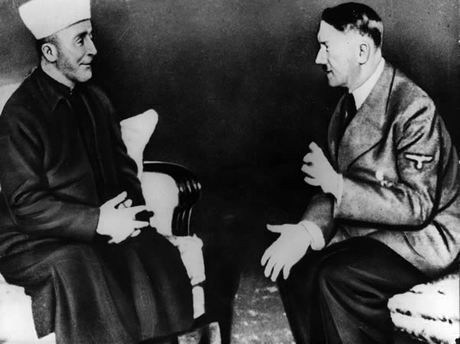
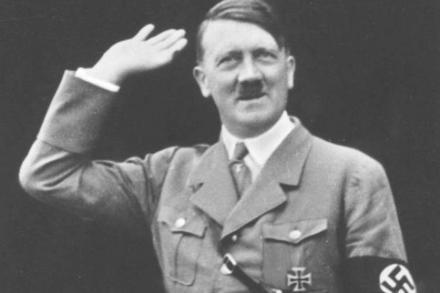
Don't forget, please, that you are looking at a mass murderer!
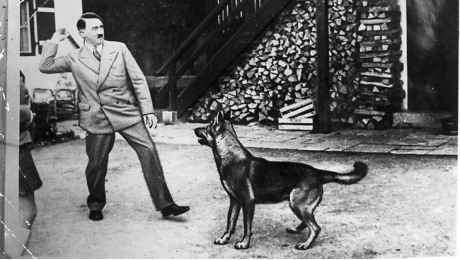
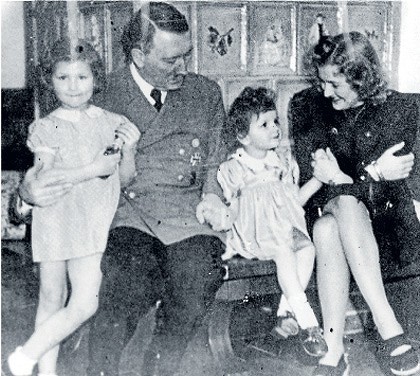
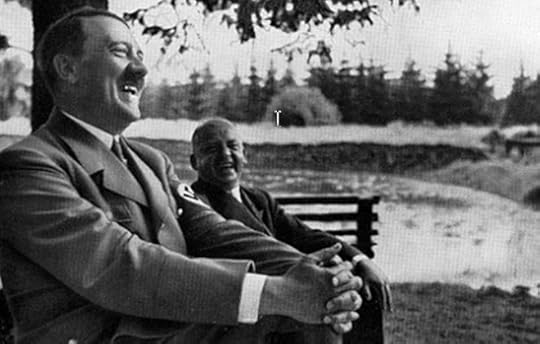
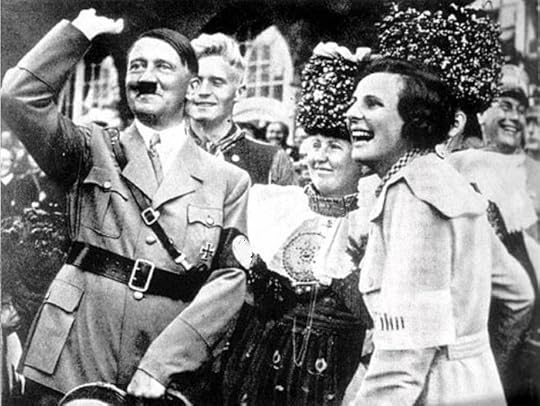

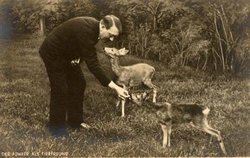
 Still seems to me that there are some recognizable significant differences between Peeperkorn and Hitler, but some do comment on Mann's seeming premonition of vulnerability to strong emotional personality.
Still seems to me that there are some recognizable significant differences between Peeperkorn and Hitler, but some do comment on Mann's seeming premonition of vulnerability to strong emotional personality.Most of the academic commentaries I have seen so far have largely sidestepped on M.P., speaking more to his colonial and imperial symbolism where they do address him.
 Peeperkorn's inflluence on others can be interpreted politically, but that is not the only interpretation. Peeperkorn is a religious figure as well. There is the pagan interpretation, MP as Bacchus: "Even drunken Bacchus, Hans Castorp thought, had propped himself on his exuberant companions without losing anything of his divinity... " He incites others to intoxication and passionate excess. There is obviously a Dionysian quality to the man.
Peeperkorn's inflluence on others can be interpreted politically, but that is not the only interpretation. Peeperkorn is a religious figure as well. There is the pagan interpretation, MP as Bacchus: "Even drunken Bacchus, Hans Castorp thought, had propped himself on his exuberant companions without losing anything of his divinity... " He incites others to intoxication and passionate excess. There is obviously a Dionysian quality to the man. But there is also the Christian interpretation. At one point when the participants around the table appear to be drifting to sleep, Frau Chauchat suggests it might be bed time. Peeperkorn considers it but then quotes scripture: "And yet please observe and recall: Gethsemane! 'And he took with him Peter and the two sons of Zebedee. Then he saith unto them, tarry ye here, and watch with me.' "
And another odd thing. Peeperkorn's hair is repeatedly described as "white flames" that encircle his head. Mann really hammers on this, so I googled it, wondering what the allusion could possibly be. I thought it a little far-fetched, but the Son of Man is described in Revelation 1:14 in similar terms.
12 Then I turned to see the voice that spoke with me. And having turned I saw seven golden lampstands, 13 and in the midst of the seven lampstands One like the Son of Man, clothed with a garment down to the feet and girded about the chest with a golden band. 14 His head and hair were white like wool, as white as snow, and His eyes like a flame of fire; 15 His feet were like fine brass, as if refined in a furnace, and His voice as the sound of many waters; 16 He had in His right hand seven stars, out of His mouth went a sharp two-edged sword, and His countenance was like the sun shining in its strength.
I wasn't convinced of this parallel, but this is what HC says after one of Peeperkorn's outbursts:
"Doomsday" -- the word fit him perfectly. Hans Castorp could not recall ever having heard anyone use the word, except perhaps in religion class; and it was no accident, he thought, for of all the people he knew, who among them was fit to release such a thunderbolt -- or better, who had the stature for it? Little Naphta might have made use of it, but it would have been a usurpation, mere caustic chatter, wheras in Peeperkorn's mouth the thunderbolt was trumpeted forth with its full crashing, booming, biblical impact.
And there's more to come...
 Thomas wrote: "Peeperkorn's inflluence on others can be interpreted politically, but that is not the only interpretation. Peeperkorn is a religious figure as well."
Thomas wrote: "Peeperkorn's inflluence on others can be interpreted politically, but that is not the only interpretation. Peeperkorn is a religious figure as well."Thank you, well-observed. Charisma itself is a mystic and religious thing, a gift of the gods. Jesus is said to have had much charisma, too. Peeperkorn as a kind of long-expected sun-shining Messias and a Bacchus whose followers are made enthusiastic by his drugs - fits well.
Politics and religion do not exclude each other ...
Lily wrote: "Still seems to me that there are some recognizable significant differences between Peeperkorn and Hitler"
Agreed. But for a 1924 book it is rather good.
If you're interested in the numbers in Mann, I read a delightful essay in an interlibrary loan book. Lots of lovely little bits.
Since the Mynheer Peeperkorn chapters are being discussed here is one nice detail from the essay. (I would never have figured it out on my own.)
Hans Castorp began his stay on the mountain in a book entitled "No 34." This was the 2nd book in the first chapter.
Mynheer Peeperkorn is introduced in the 2nd book in the last chapter. And oddly enough, he, too, relates to number 34. There is a Mynheer book, then 21 (Vingt Et Un), then Mynheer (continued), then Mynheer (continued). 3 of 4 are "Mynheer Peeperkorn," thus "34."
It's a very enjoyable essay if you like the numbers game. You can only access the first page through the link below...and the essay doesn't really turn it's attention to Magic Mountain until page 2.
http://www.jstor.org/discover/10.2307...
"Mynheer Peerkorn and the Lofty Game of Numbers"
Oscar Seidlin
Since the Mynheer Peeperkorn chapters are being discussed here is one nice detail from the essay. (I would never have figured it out on my own.)
Hans Castorp began his stay on the mountain in a book entitled "No 34." This was the 2nd book in the first chapter.
Mynheer Peeperkorn is introduced in the 2nd book in the last chapter. And oddly enough, he, too, relates to number 34. There is a Mynheer book, then 21 (Vingt Et Un), then Mynheer (continued), then Mynheer (continued). 3 of 4 are "Mynheer Peeperkorn," thus "34."
It's a very enjoyable essay if you like the numbers game. You can only access the first page through the link below...and the essay doesn't really turn it's attention to Magic Mountain until page 2.
http://www.jstor.org/discover/10.2307...
"Mynheer Peerkorn and the Lofty Game of Numbers"
Oscar Seidlin
 All very interesting (finally reading this thread as finally reading this chapter). I think that yes, due to MP's great success and resulting wealth resulting from coffee growing in Java (NB: excellent coffee)( I type with my coffee mug at hand), he has gained some perceived authority and also actual self confidence that is attractive to the "masses". MP gesticulates with his hands in such a fashion that seems to fascinate the people ...which reminds me of videos I have seen of Hitler..how he uses arm motions to strengthen his "points". Somehow effective at least as to providing drama to it all. Again, TM could not be patterning MP on Hitler, but TM's addition of MP as a character seems most prescient.
All very interesting (finally reading this thread as finally reading this chapter). I think that yes, due to MP's great success and resulting wealth resulting from coffee growing in Java (NB: excellent coffee)( I type with my coffee mug at hand), he has gained some perceived authority and also actual self confidence that is attractive to the "masses". MP gesticulates with his hands in such a fashion that seems to fascinate the people ...which reminds me of videos I have seen of Hitler..how he uses arm motions to strengthen his "points". Somehow effective at least as to providing drama to it all. Again, TM could not be patterning MP on Hitler, but TM's addition of MP as a character seems most prescient.As to the drinking..I note MP likes the bread..er...gin..; TM writes that MP suffered from intermittent tropical fever..which made me ponder if he suffered from malaria and was that gin and tonic (quinine known to have good anti-malarial effect) (albeit TM doesn't mention the tonic but MP states he drinks it for health effects (at least in part))
 Thorwald wrote: "Peeperkorn obviously has power over the people. This is enough to make him a political person. "
Thorwald wrote: "Peeperkorn obviously has power over the people. This is enough to make him a political person. "In the Greek concept of the polis, where there was little distinction between political and social power, I agree with this thought. But in early 20th century Europe, I'm not so sure. By that time, politics was becoming dominated by professional politicians, which was quite separate from the business, professional, academic, and theological spheres, where a person could have much power over people without being in any sense a politician. My ancestors in England, for example, were quite prominent in the business sphere (founders of such businesses as Cadbury's and Barclay's bank, though sadly none of that wealth trickled down in my direction), and holding a number of professional and academic positions, but I'm not aware of any of them who were prominent in politics or the political sphere.
 Adelle wrote: "If you're interested in the numbers in Mann, I read a delightful essay in an interlibrary loan book. "
Adelle wrote: "If you're interested in the numbers in Mann, I read a delightful essay in an interlibrary loan book. "Although it happens in week 9 reading, not week 8, this might be a time to inject a number comment which isn't in any way a spoiler.
We have mentioned before the significance of the number 7 in the book (as in room 34 being 3=4=7), so I picked up on the fact that on the excursion discussed in Peeperkorn (Concluded), there were 7 people who went. Not, I think, a coincidence.
There was a good feel to spotting the numbers I found.
 Everyman wrote: "In the Greek concept of the polis, where there was little distinction between political and social power, I agree with this thought. But in early 20th century Europe, I'm not so sure. ... ... ... but I'm not aware of any of them who were prominent in politics or the political sphere."
Everyman wrote: "In the Greek concept of the polis, where there was little distinction between political and social power, I agree with this thought. But in early 20th century Europe, I'm not so sure. ... ... ... but I'm not aware of any of them who were prominent in politics or the political sphere."Not agreed. The Greeks weren't so wrong, everything is political what happens publicly, and even private acts have impact on society, are political.
You cannot found banks like Barclay's without political impact and connections. When I see such phenomena like political correctness blocking clear thought in so many fields then it becomes very clear that each and every public act is always a political act, too. This is not only a weird idea of Greek thought.
In Italy, e.g., it was a businessman who took over politics, Silvio Berlucsconi. A very "Peeperkorny" man ... especially considering his special relations to young oriental girls.
(view spoiler)
 Just moved to Background some comments on M.P. and Mann's inspirations for him that I had started to post here.
Just moved to Background some comments on M.P. and Mann's inspirations for him that I had started to post here.
 A question for the German readers:
A question for the German readers:I was struck by the pun/malapropism of "magnet" and "magnate" when Frau Stohr, upon meeting Peeperkorn, calls him a "money magnet." This works beautifully in English because the words are (at least sometimes) pronounced the same, and the double-meaning--a magnate as one who draws money to him as if "magnetically"--works here. That led me to the question of what the original German is in this passage. Did Woods come up with an entirely different pair of words than in the German, or are "magnate" and "magnet" very similar in German and in English?
 Kathy wrote: "Did Woods come up with an entirely different pair of words than in the German, or are "magnate" and "magnet" very similar in German and in English?"
Kathy wrote: "Did Woods come up with an entirely different pair of words than in the German, or are "magnate" and "magnet" very similar in German and in English?"Works exactly the same way: Magnat - Magnet. One vowel difference.



Certainly the contrast between HC and MP, Clavia's apparent two main admirers, is stark. Not only age, though that is stark enough with HC still in his early to mid 20s and MP 60 years old. It is also that although HC has been a resident here for two years or so, MP almost immediately becomes a much more central and popular character, so that "malleable youth felt crushed beneath the weight" of MP.
Whereas earlier in the book we noted that cigars had taken on the role of women, here "life, young man, is a woman, a woman sprawled before us, with close-pressed bulging breasts and a great soft belly between those broad hips..." Just exactly what does this mean? What does MP mean by saying it, and what does Mann mean by having him say it?
And did everybody notice the change Mann shows in HC? After MP's expansive speech, "Should he [HC] not have kept silent after the aforesaid thunderbolt? What could his prim voice accomplish? But discussion was a habit now...."
Our ordinary young man is developing, changing, isn't he?
(Question for our German speakers -- is Peeperkorn the German for Peppercorn?) If so, why that name??